Kind of Wild is a weekly newsletter on vegan travel, international living, slow adventuring and ethical luxury. I am a 40-something published author, podcaster, public speaker, charity PR specialist and writer. I speak four languages and live in Brighton, UK. I’ve been vegan for over a decade and never say no to cake.
I first visited Italy as a twelve-year-old and it blew my mind. On a family holiday on the Amalfi coast, I felt like I was in a different world - and the worst thing that could happen was having to leave. There was something about the general Italian atmosphere that made me feel like the giant hand of destiny had finally scooped me out of Sweden and dropped me where I belonged. I had never cried as much as I did when we headed back to the airport, just out of fear of potentially never getting to come back.
That was before I realised that if I set my mind to something…I was likely going to move there.
As I started toying with the idea of becoming a fashion journalist in my teens, I realised that there was one place that fashion really proliferated: Milan. The ultimate in high glamour, Milan seemed to hold the best of both worlds for me - the fashion alongside that Italian warmth I’d been exposed to in my teens (ah, if I’d only known). All of a sudden, living in Milan was high on my bucket list.
I did briefly live and work in Italy before moving to Milan. I was a seasonal worker in a hotel in a small Tuscan village, and once my temporary work contract there ran out, I was back home in Sweden, desperately searching for a way to return to Italy. The golden ticket presented itself in the form of an au pair agency, hiring young people to work as babysitters for Italian families. My experience from Tuscany, where I’d worked as a children’s entertainer for the summer, clinched it and I was placed in a Milanese family.
Prior to leaving, I’d been doing extra work in kindergartens in Sweden (this was before you needed a degree to do this kind of work; you could just show up) so let’s say money wasn't exactly flowing. Plus, being as spectacularly bad with money as I am, you can imagine I wasn’t huge on saving, either. But I didn’t necessarily see this as an issue - the agency paid for my flights and the accommodation was offered by the family. And once I was there, I’d start making money, right? Sure, I’d only be earning 80 euros per week. But with food and rent taken care of, I expect to be fine. I take my remaining stash to the currency converter, ending up with 200 euros in cash, which is burning a hole in my pocket when I land in Milan that day in January 2005. I am twenty years old.
I get to live in the father’s office, two streets down from the family’s flashy Colonne di San Lorenzo address. I walk back there every night after I clock off, about 9pm. I have a small bedroom there, with a coffee machine in the bathroom - I go brush my teeth in the morning and find the father’s coworkers making coffee in my bathroom. I meet the father himself only once, as he is constantly away for work. The mother, on the other hand, does mention a job but I never see her go to it - however, she’ll disappear for large chunks of the day, or just lock herself in her room, leaving me alone with their three-year-old daughter, who is my job.
I am gobsmacked when I realise that the family has a full-on housekeeper. That’s right, in 2005. The South-American woman, who refers to the mother as la signora rather than her first name (I’m glad I get to hear that before making a fool out of myself by jumping straight to first-name basis, the Swedish way), comes to the house every day to clean, cook, and fold the laundry. I am absolutely horrified when it dawns on me that, despite this, cooking for the little girl is a task that is fully on me. Despite the au pair agency assuring me that housework wouldn’t be part of the deal, I find myself wrangling up pasta so foul that the child prefers to go hungry (what can I say, my 20-year-old cooking skills are limited to buying donuts). As for my own food, despite the agency reassuring me that my vegetarian diet would be taken care of, the family never buys me anything veggie. The mother gives me directions to a supermarket where I can find veggie burgers. It is clear that I am supposed to buy them myself, with my 80 euro a week salary.
It is during this time that I learn something about myself which continues to be true today and is frankly quite a big part of my decision to be child-free: I hate playing. Gosh, I loathe it. I mean the role-playing that children do: playing that you work in a shop. That you’re a mum and daughter. That you’re sisters who are both princesses. To this day, I would honestly rather do math, clean the house, or listen to my husband explain how a motorcycle engine works (okay, maybe not that). And this child, God love her, does not want to do one single other thing. Read a book? No. Face painting? No. Play a board game? No. Watch some cartoons while I put away toys in blessed quietude? Sometimes yes, but only for fifteen minutes until we have to play princesses again. I glance up towards the huge box of board games atop the cupboard and fantasise about all of them falling on my head. “Make her play something else,” the mother remarks, floating past in a rare moment of distracted presence. “Sounds so boring to do princesses all the time.” Upon which I suggest something else and the mother comes running, wondering why her child is screaming bloody murder.
A couple of weeks into the job, the mother slaps the little girl in the street, causing her to fall over and cry. That is the day I decide to leave the family and hand in my notice. I am told to vacate my room the next day.
Only where am I supposed to go? I know absolutely no one in Milan, aside from the many guys I go on dates with, whom I meet on chat sites. So I set out looking for a room to rent, the only way I know how: visiting agencies and looking at ads. One agency takes my money and prints off a page from the newspaper with flat ads. They don’t help me make any calls, nothing. I drop most of my remaining money with them. But off the back of that newspaper page, I find a room in a flat in via Padova, a street which at that time is considered one of the most dangerous and unrestful in Milan. The Egyptian man renting out the space also has two Ukrainian ladies living in the room next to mine. They make me tea as I shiver through the evenings: it’s February and the owner refuses to switch the heating on, as he is keen to save money. I sleep with two sweaters on. This is a reality I learn about Italy: it can be very cold! A far cry from my Amalfi Coast holidays as a child. I never get to see much of Milan. In my mind, it could be any city. The glamorous fashion aspect is nowhere to be found as I climb up the dirty and rickety stairs to the third-floor flat in via Padova.
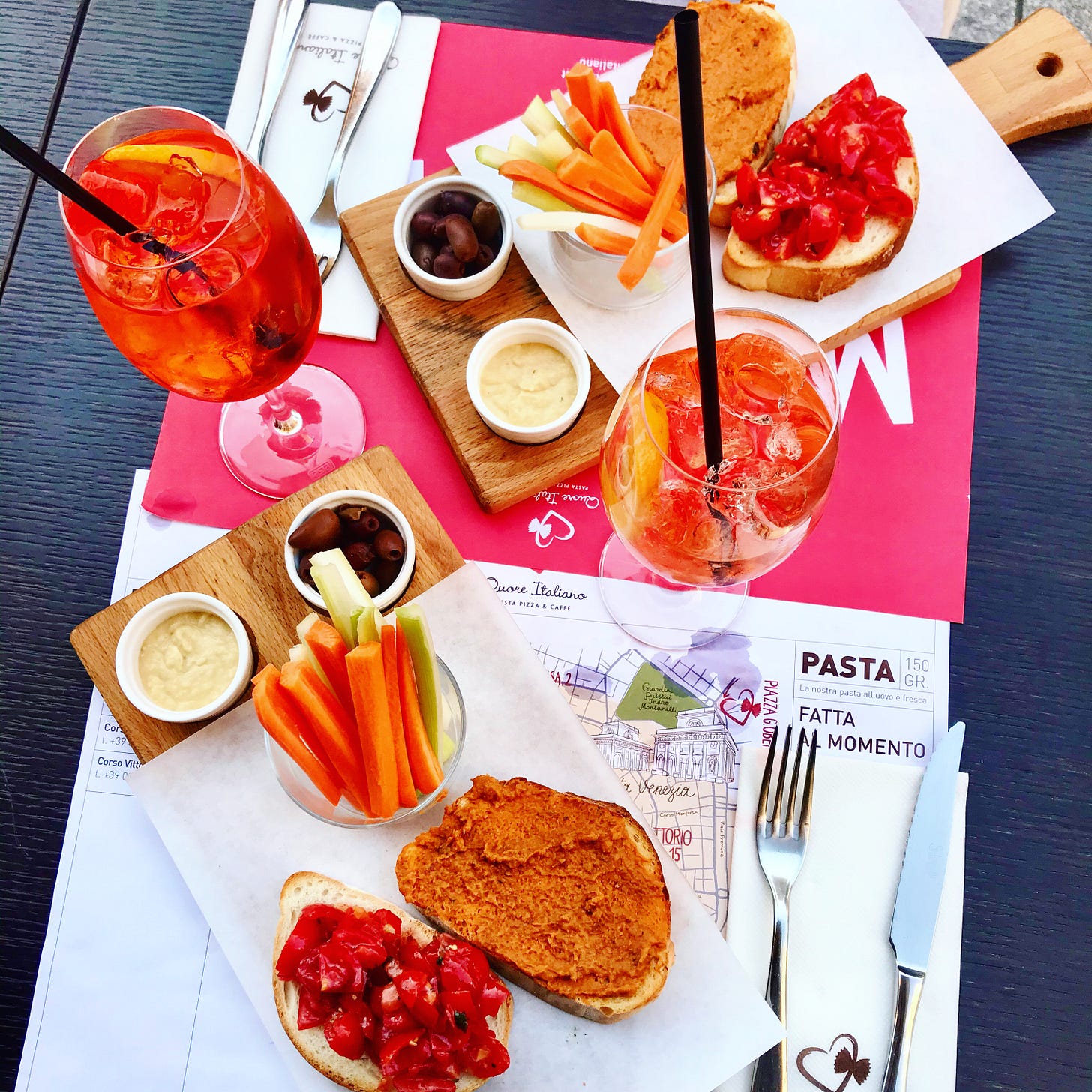
Money is running extremely low. Every day, I walk around the city looking for work. I go to the busiest streets and walk through every door, from restaurants to shops, asking for a job. At some point, I will come across an internet café, where I print off more CVs. Those long walks are my only form of sightseeing. In the evenings, I’m sometimes taken on dates by the men I meet on chat sites. I’m not genuinely interested in any of them - I just want companionship that’s not limited to the Ukrainian ladies living in my flat. One of the guys tells me he has a job for me and to come meet his friend who runs a restaurant, only to drive off and leave me standing in the middle of the street. Another one ghosts me when I make it clear that I’d like to go somewhere public, rather than meet at his house. A third one promises me a sales job in return for sex and no, I’m ashamed to say I don’t yell at him or call the police. I say no to the “opportunity,” but I still go out for a drink with him. As expected, he’s boring and full of himself, and I go home feeling empty. Like I said, companionship - any kind, really, doesn’t have to be quality. I keep hunting it down, starving for it. I go to countless nightclubs, pretending to fawn over the fact that my date knew someone at the door and we didn’t have to queue. I eat so many plates of pasta that I didn’t order, as the guy insists on ordering for us. I am introduced to other girlfriends with the words “she’s Russian too”, as if that means we’d automatically have something to talk about. We don’t, and we just silently stand there, waiting for the guys to turn to us again. I buy magazines instead of food - Carrie Bradshaw was right, they feed me more. My parents call frequently, incredulous as to why I’d choose this life over going home to Sweden. But I can’t explain it. Making it on my own is so crucial to me. I want to create a life in the location I choose, on my own terms - no matter how hard it is. I’m confused about many things, but I know one thing for certain: I’d rather have a horrible life that I chose, rather than a nice one that just happened to me.
One day, I get offered a job in a nightclub. “You have to dance with the clients,” says the man on the phone. “They will offer you drinks and you have to say yes. There’s nothing wrong with it. It’s nothing sketchy.” He repeats this so many times, so keen to establish that nothing sketchy is going on, that it’s clear that something is sketchy. That’s when a guy who used to live in my room offers for me to move in with him and two friends, a guy and a girl, for free. I finally feel like I have friends, like someone cares about me. I drink sweet Sicilian wine with the three of them in their living room. I laugh. For the first time in two months, I go to sleep peacefully.
I am offered a job in the fanciest hotel in Milan. It’s a luxury five-star establishment and they would like me to work their phones, starting at 7am. I am floating on little clouds - until I visit an internet café and find an email from the resort in Tuscany where I was working as a children’s entertainer the previous summer. They want me to come back in two months - as a receptionist, which is a considerable upgrade. It’s like all my dreams come true at once. I call up the fancy hotel and say no to the job, and move out of the three friends’ flat. I decide to go back to Sweden for a couple of months before heading to Tuscany. One of the men from the chat site drives me to the airport. He’s perhaps the only genuinely nice guy I’ve met on those chat sites ever. Throughout my entire time in Milan, he never tries laying a finger on me even once. He’d only stare at me with sad puppy eyes while telling me about his ex-girlfriend, whom he is still in love with. Once, he takes me to an excruciatingly expensive vegetarian restaurant where he works so hard to hide his dislike for the food, while I wolf it all down. He pays the enormous bill. Now, he helps me carry my giant suitcase through the departures hall. I never hear from him again. Wherever he is today, I hope he’s happy.
I never spare another thought for Milan until, two years later, I meet the man who will be my husband. I’m back at the Tuscan resort again - I end up working there for five summers. When David tells me he is from Milan, my first thought is that I’m not done with that city. I do end up going back there countless times, and it’s now one of the places I consider a hometown. David and I often wonder if we ever passed each other in the street back in 2005. He always says that he’s sorry he didn’t meet me back then. That he’d take me home to his mum’s for a meal, take a walk with me, and just talk to me like a human being. But I think I needed that time, challenging as it was. I needed it to spread my wings and learn to grow on my own, standing on my own two feet, even if they were unsteady.
David and I end up moving to Milan for two years. We live in a tiny studio flat in the Navigli area - one of my favourite places in the world. We go see the museums and parks. We have aperitivo on the canals in the summer. I finally get to know Milan and realise I was right to idolise it all that time ago. One night, we’re walking home from a party and we walk past that house by the Colonne di San Lorenzo. I point out to David that this is where the family I worked for used to live. Turns out they still live there. David proceeds to prank-call their buzzer and wake them up. “They deserve it”, he smiles as we run off, giggling like teenagers. “They beat their kid and treated you awfully, they can take a prank call.” I squeeze his hand as we walk past the Colonne and back to our little shoebox flat in the Navigli, past throngs of people and lively bars. It’s a warm summer night, the city is still alive, and I’m alive too. Perhaps more alive than ever.




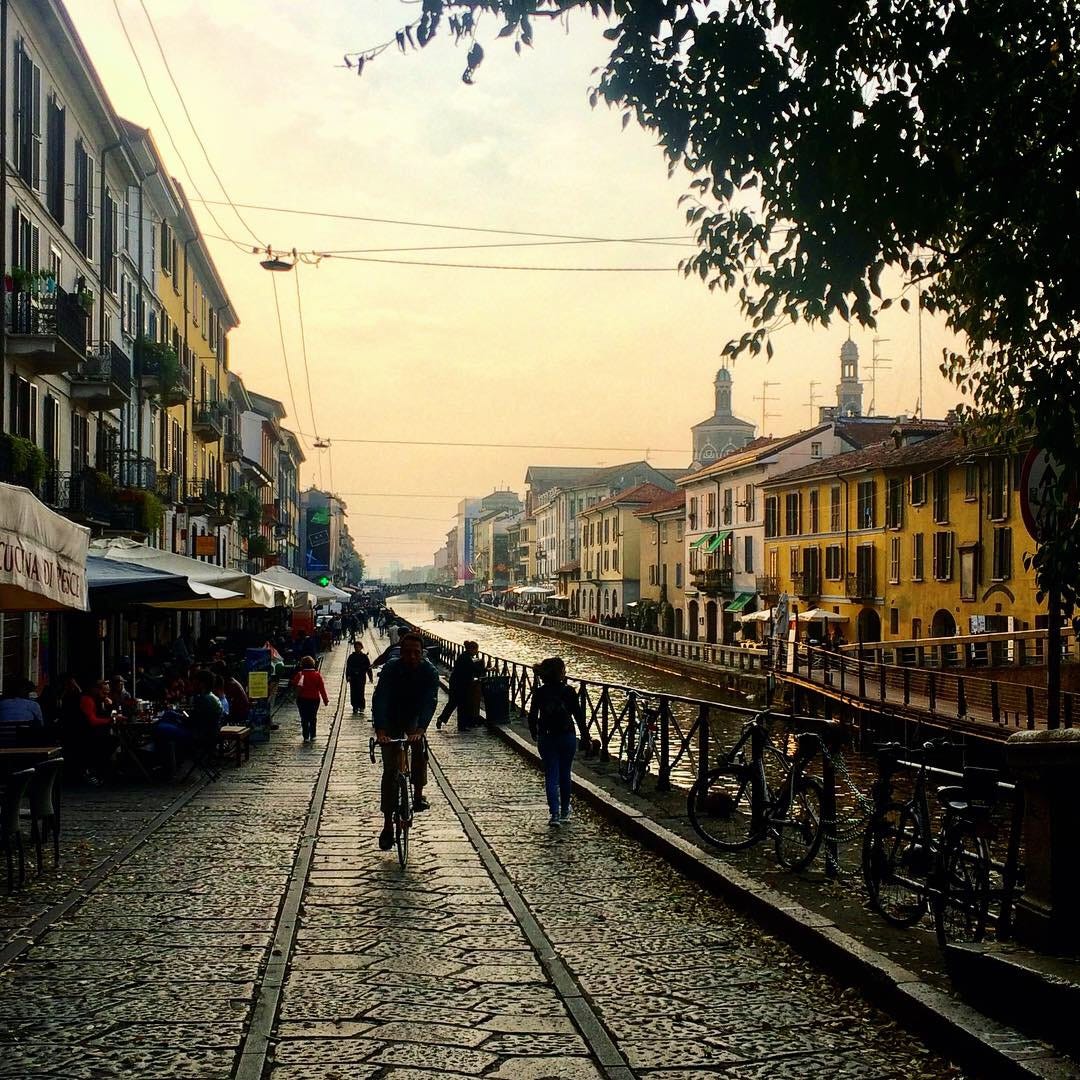
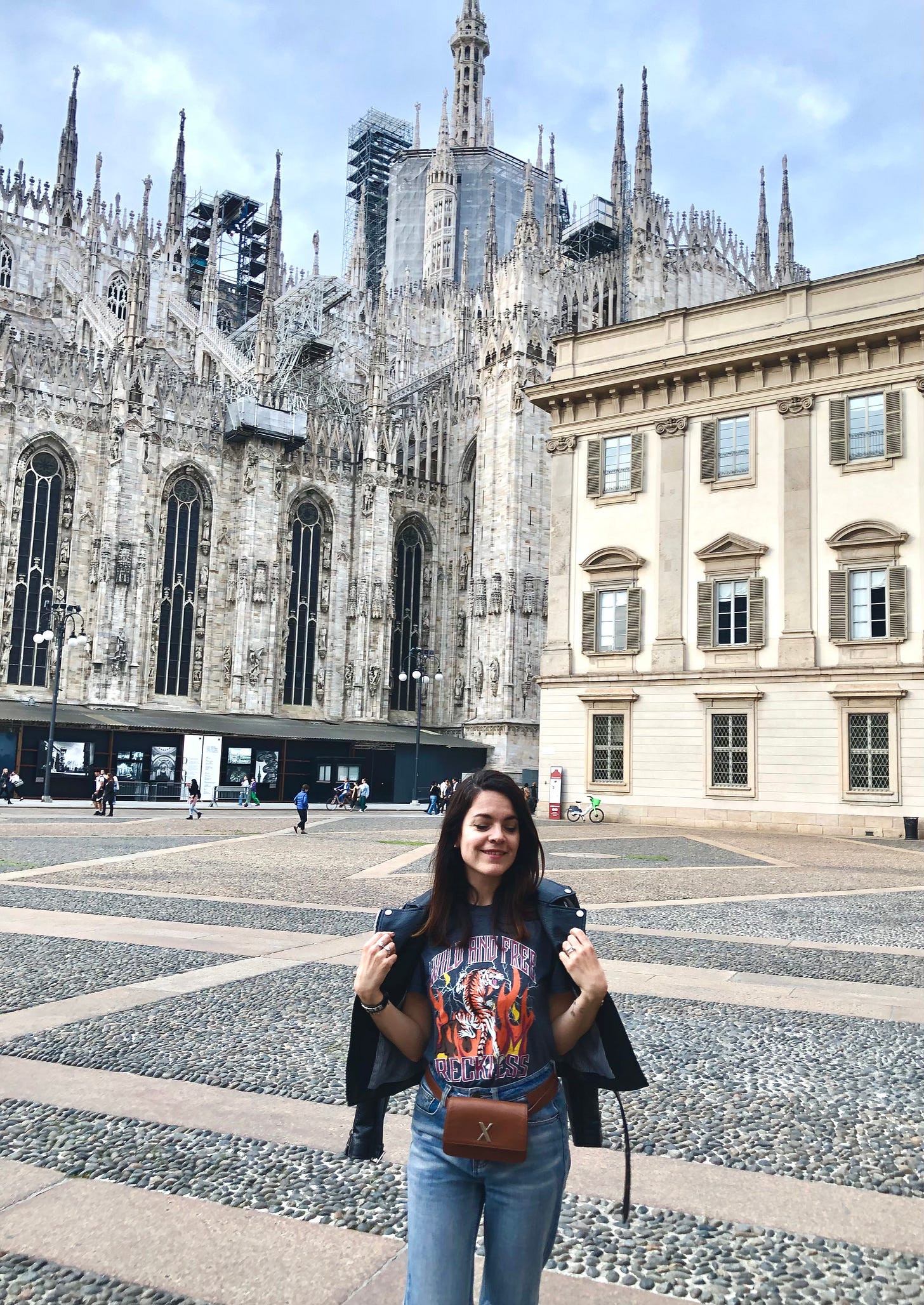
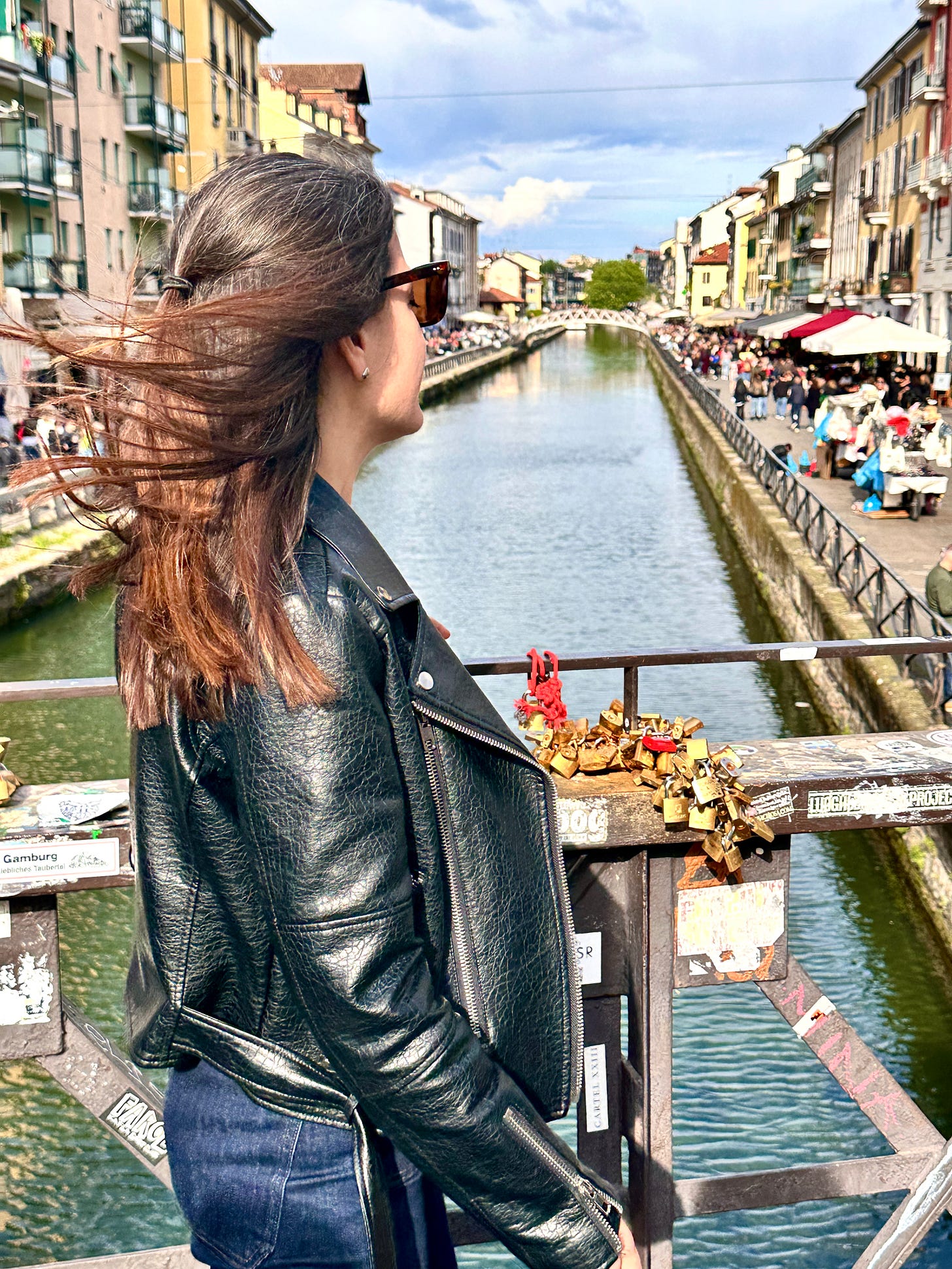
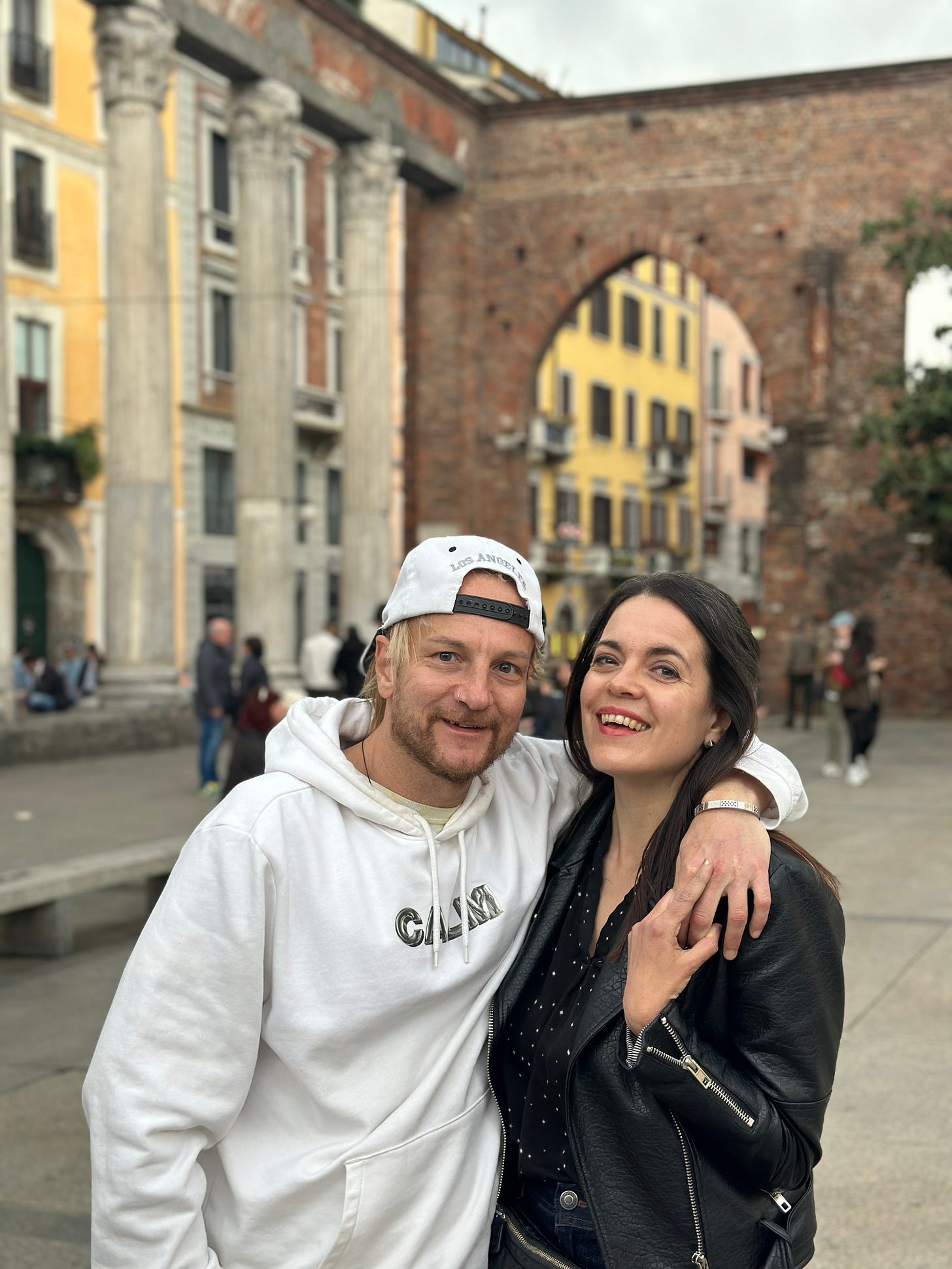
Milan?? Nah bad idea!